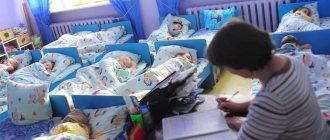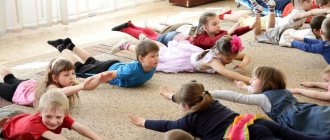Teachers in kindergarten have many important tasks. In many cases, self-analysis and self-assessment of a teacher’s professional activity is based on an analysis of the psychological and pedagogical process he carries out and its effectiveness. Creating conditions acceptable for children of certain age categories allows the teacher to most fully engage in strengthening the mental and physical health of children. And do this in accordance with their personal capabilities and age characteristics.
What kind of worker is this, what does he know and can do?
Before we figure out who a kindergarten teacher is and what requirements are placed on him, we note that when assessing the competencies of such an employee, the norms of special documents should be taken into account:
- Federal State Educational Standard (FSES) for preschool education, approved. By Order of the Ministry of Education and Science dated October 17, 2013 No. 1155;
- professional standard, approved. By Order of the Ministry of Labor dated October 18, 2013 No. 544n.
These two standards apply to everyone who belongs to preschool workers - nannies and educators, psychologists and speech therapists, music directors and physical education teachers who work in private and public kindergartens. And on their basis and information from the Unified Qualification Directory (USD) for the positions of managers, specialists and employees (the section concerning the qualification characteristics of positions for education workers), employers draw up job descriptions with responsibilities that subsequently guide both the employees themselves and their superiors.
If you intend to find out what a kindergarten teacher should know according to the Federal State Educational Standard, you will have to limit yourself to only the wording of officials about what they want from such an employee. He must have the competencies to create conditions for (see clause 3.2.5):
- regular communication with each child, taking into account his feelings and needs;
- support and development of children;
- establishing certain rules of behavior in different situations;
- normal interaction with parents.
Details about what knowledge and skills will be useful for a preschool teacher to perform their duties are listed in the EKS and the professional standard. The EKS states that he needs knowledge of laws and educational programs, the fundamentals of pedagogy and psychology, methods of educational work, basic information from the field of ecology, economics and sociology. To this are added skills in working with computer programs and multimedia equipment. In the professional standard, this list was supplemented with nuances taking into account the type of labor function. Thus, when performing developmental work as a teacher in a kindergarten, you will need the ability to form and implement individual development programs, and to fulfill the responsibilities of education, you need the ability to motivate children for educational and cognitive activities.
But all these are dry normative acts, and in real life, a kindergarten teacher is a person who loves children, has a great desire to become their first guide to adulthood, and knows how to resolve conflicts. It’s great if he manages to find an approach to each baby, provide first aid and cuddle the child. Such an employee must take care of his appearance, be able to speak correctly, and find an approach not only to the students, but also to their parents.
If we talk about educational requirements, then usually persons with secondary vocational or higher education in the field of pedagogy, psychology or sociology are appointed to the position of educator, preferably with work experience, knowledge of child psychology and speech therapy, methods of development of preschool children. Refresher courses wouldn't hurt.
To effectively perform the duties of a teacher in a kindergarten according to the Federal State Educational Standard and the professional standard, a person must have certain personal qualities, including:
- love for children and the ability to find an approach to any child;
- organizing abilities;
- positivity and cheerfulness;
- stress and psychological stability;
- communication skills and organization;
- speech literacy and high cultural level;
- the ability to make quick and correct decisions in any situation.
Important and mandatory qualities of a teacher are kindness, goodwill, hard work, responsibility, and accuracy.
ConsultantPlus experts looked at how to organize a family kindergarten. Use these instructions for free.
Self-analysis and self-assessment of a teacher’s professional activity as a basis for planning
For an adequate assessment, the teacher will have to make a comparison between the planned results of his own activities and the real ones obtained during the process carried out in practice. At the same time, it should be noted which achievements of students are the result of talented events or a whole system of pedagogical techniques.
It is necessary to identify certain deficiencies, identify ways and methods for their improvement, and use new technologies and methods in your work:
- Research. Children put forward hypotheses, carry out observations, check the correctness of decisions. Development of generalization abilities leading to correct conclusions.
- Experimentation. Fulfilling the desire of preschoolers to independently find a solution to a non-standard situation.
- Integration. Development of a child’s personality through improving his creative and cognitive abilities.
The active activities of children's pupils are carried out under the strict guidance of the group leader using self-analysis and self-assessment of the teacher's professional activities.
Teachers use various forms of working with children. Greater efficiency was noted in excursions, educational and outdoor games, and experiments. An unbreakable connection with parents is possible using consultations and conversations. And also jointly organized holidays will improve the education of the future generation.
What does he do?
In general terms, upbringing, education, care, and supervision of children is what a kindergarten teacher does, regardless of the form of ownership of the preschool educational institution. But to complete all the documentation, the employer will need a professional standard from the Ministry of Labor, which clearly states the functional requirements for the employee. The order of the Ministry of Labor indicates, among other things, what is the responsibility of a kindergarten teacher and teacher when admitting children to a group:
- regulating children's behavior to ensure a safe educational environment;
- implementation of educational opportunities for various types of child activities (educational, play, work, sports, artistic, etc.);
- development of students' cognitive activity, independence, initiative, creative abilities, formation of citizenship, ability to work and live in the modern world, formation of a culture of healthy and safe lifestyle among students;
- the use of constructive educational efforts of parents (legal representatives) of students, assistance to the family in resolving issues of raising a child.
Self-analysis of the job functions of a preschool teacher
It is important for a teacher working with preschoolers to understand the criteria by which he should evaluate and analyze his work activity. At the same time, take into account the number of students in the group. The educator must solve his problems with the help of the institution’s special educational program. It was developed on the basis of the “Childhood”, “Development” or other programs proposed by the Ministry of Education of the Russian Federation.
Articles on the topic
- What is professional stress, its main signs and types 08/29/2021
- What is the role of self-esteem in choosing a profession 08/13/2021
- What does success in business depend on and how not to lose it 07/12/2021
- Tasks of modern psychology in the field of development and formation of human personality 02.28.2021
He can choose several areas of activity:
- working with different age groups;
- classes with talented children and features of their upbringing;
- teaching children Russian if it is a second language for them;
- use of inclusive education programs;
- work in groups with different periods of stay for children;
- work in a group preparing students for school;
- interaction with socially neglected children or those in difficult life situations.
It is also possible for the teacher to choose other directions. Which allow children to fully realize their capabilities and develop interests. By carrying out self-analysis and self-assessment of the teacher’s professional activity, it is possible to systematize the work he has done and note achievements and shortcomings.
The tasks of the teacher in the group include reaching out to each child and including him in active activities. Development of initiative in children, assistance in finding the right solutions and ways out of various life situations.
One of the important indicators of a teacher’s performance is the health of preschool children. This task is carried out jointly with the medical worker and those responsible for the physical education of children.
Main responsibilities
Let us list the responsibilities of a kindergarten teacher in the junior group and any other open in a preschool institution:
- exercise control over the life and health of children during their entire stay in the kindergarten;
- conducting various types of activities, developmental, sports, preparation for holidays, etc.;
- create a favorable atmosphere that promotes conflict-free communication between children;
- instill self-service skills in students;
- resolve conflicts, show restraint and tact with children and their parents;
- monitor the health status of pupils;
- immediate notification of danger and force majeure situations to immediate superiors or the appropriate service;
- undergo a medical examination according to the schedule.
IMPORTANT!
Some responsibilities in the nursery group of a kindergarten are different from what you have to do in junior or senior children. Children come to the nursery very young, often not even able to speak, they are not yet able to fully take care of themselves, and often cry. And in the younger group, the pupils are older, more responsible, and the majority have already undergone initial adaptation to new conditions. And if we talk about older people and “graduates,” then they need full-fledged training and development, and not training in self-service skills, like kids.
Developing a plan
The senior teacher is required to develop a work plan and daily schedule for the kids. Moreover, it is advisable to coordinate it with the parents. For example, at the first parent-teacher meeting, which is usually held before the start of the school year. With all this, it is necessary to take into account the behavioral characteristics of each baby and the development of children. And in accordance with the data received, think through an effective plan. In other words, it must take into account individual characteristics.
In reality, the situation turns out to be a little different. Lesson plans with detailed instructions are most often downloaded from the Internet, slightly edited (usually the name and address of the kindergarten, as well as the initials of the teacher “developer”) are edited and presented to parents. They, in turn, agree with everything. But the job responsibilities of a teacher include developing a correct and effective schedule of actions for the entire school year! And, as a rule, such plans cannot be edited.
In fact, it is very convenient to borrow someone else's designs. But children are all different. And they need a purely individual approach. Some people develop faster - they need more difficult classes (it’s better to give everyone something different), while others develop more slowly. Such kids will have to pay special attention. A good teacher should take these features into account and adapt a ready-made plan to the children. Or develop it yourself.
Rights
The rights of an employee are secured by the Labor Code of the Russian Federation and the Federal Law “On Education”. Among those that employers list in the job description of a kindergarten teacher are the following opportunities:
- make proposals to improve the educational process;
- receive social guarantees and benefits in accordance with the legislation of the Russian Federation;
- demand improved working conditions;
- have paid leave;
- with mutual agreement, exchange shifts with a second employee;
- demand the elimination of faults in the entrusted territory and the creation of normal working conditions.
Basic rules for drawing up a job description
Since the law does not define the concept of “job description,” it can be drawn up in free form, in accordance with the needs and ideas of the employer about this document. However, in order for the document to gain legal and enforceable force, certain standards must still be met. In particular, the document must always indicate
- name of company,
- position, surname, name, patronymic of its representative,
- as well as information about the employee.
The document must be signed by both parties , and if it is necessary to make any amendments to the “working” job description, you need to print a new corrected document, which indicates the new date and which is certified in the same order.
Typically, a job description is created in a single copy, but if there is a need, for example, the staff has several employees of the same specialty, but with different functions, adjustments are made to it and an individual document is printed for each employee.
Responsibility
The legislation defines not only the duties, but also the responsibilities of employees. In particular, the teacher is responsible for:
- preserving the life and health of children in the group;
- safety of pupils’ personal belongings;
- compliance with safety and labor protection instructions;
- the use of unacceptable methods of education, violence and rudeness;
- inappropriate performance and failure to complete one's work;
- use of working time for personal purposes;
- abuse of authority.
Violation of assigned duties may result in disciplinary action, and for “particularly serious” offenses the teacher may be dismissed.
Hygiene and medicine
The job responsibilities of the teacher also imply compliance by the employee himself with sanitary standards and hygiene rules. This also applies to children. That is, the teacher is obliged to monitor sanitary standards in the group, as well as the children’s compliance with hygiene rules.
You will have to worry about your health, both your own and your children’s. In other words, the employee is obliged to undergo a medical examination in a timely manner. And, in addition, take children for routine examinations. Usually there is a nurse or pediatrician right in the kindergarten building.
In addition, it is the teacher who is obliged to report suspicions of any disease, and also to show the child to the doctor if the baby is already exhibiting certain symptoms of the disease. When a child becomes ill, the teacher must also show him to the nurse in the kindergarten. If necessary, as already mentioned, you will have to call the parents, tell them about what happened, and also ask them to pick up the baby and show him to the doctor.
Normative base
Order of the Ministry of Labor of Russia dated October 18, 2013 No. 544n “On approval of the professional standard “Teacher (pedagogical activity in the field of preschool, primary general, basic general, secondary general education) (educator, teacher)”"
Order of the Ministry of Health and Social Development of the Russian Federation dated August 26, 2010 No. 761n “ On approval of the Unified Qualification Directory of positions for managers, specialists and employees, section “Qualification characteristics of positions for education workers”"
Order of the Ministry of Labor of Russia dated January 10, 2017 No. 10n “On approval of the professional standard “Specialist in the field of education””
Federal Law of December 29, 2012 No. 273-FZ “On Education in the Russian Federation”
Order of the Ministry of Education of Russia dated July 31, 2020 No. 373 “On approval of the Procedure for organizing and implementing educational activities in basic general education programs - educational programs of preschool education”





